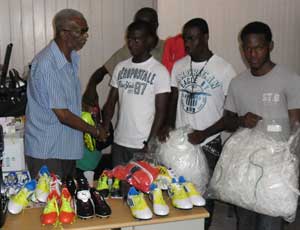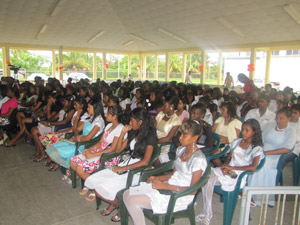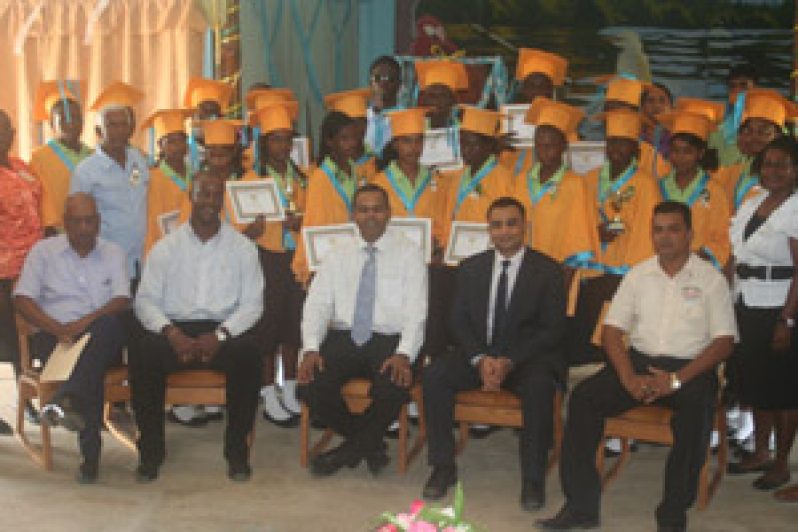EDUCATION has long been acknowledged as the foundation upon which national development is built, and therefore much emphasis has been on ensuring access to education in whatever form possible.
 Education in Guyana from nursery to the secondary is free, and in addition, further advancements at the technical institutes, for instance, is also free. It is important to note that not all youths have continued educational opportunities set before them, and so government has also recognised the need for academic advancement for those who are underprivileged or need another chance to develop themselves.
Education in Guyana from nursery to the secondary is free, and in addition, further advancements at the technical institutes, for instance, is also free. It is important to note that not all youths have continued educational opportunities set before them, and so government has also recognised the need for academic advancement for those who are underprivileged or need another chance to develop themselves.
This is evident in the availability of training opportunities like the Community Action Component of the Citizens Security Programme of the Ministry of Home Affairs, National Training Programme for Youth Empowerment (NTPYE) under the Board of Industrial Training (BIT), Youth Entrepreneurial Skills Training (YEST) and President’s Youth Award: Republic of Guyana (PYARG), all of which form part of the fundamental principles of the People’s Progressive Party / Civic (PPP/C) administration to ensure equitable access to education by all its citizens.
There has also been one-off training for youths in various skills, including the use of computers. The Basic Needs Trust Fund (BNTF) has facilitated training of Buxton youths in this regard.
Youth Entrepreneurial Skills Training
The YEST programme was introduced in 2000 with the aim of providing out-of-school, unskilled and unemployed youths with continuing education and skills which are fully accredited and equated to Caribbean vocational qualifications.
Thus far, over 2000 students have benefitted from training, through the Kuru Kuru Training Centre (KKTC) and Sophia Training Centre.
In 2012, the first batch of 19 students from the New Opportunity Corps in Essequibo, Region 2, graduated from the YEST programme. Under the purview of the Ministry of Culture, Youth and Sport, YEST affords youths the opportunity to benefit from programmes such as business studies, carpentry, electrical installation, joinery, masonry, motor mechanics, plumbing, welding and fabrication, garment construction, catering, home management, office administration and information technology, refrigeration and air conditioning, handicraft, welding and fabrication and masonry.
Under the purview of the Ministry of Culture, Youth and Sport, YEST affords youths the opportunity to benefit from programmes such as business studies, carpentry, electrical installation, joinery, masonry, motor mechanics, plumbing, welding and fabrication, garment construction, catering, home management, office administration and information technology, refrigeration and air conditioning, handicraft, welding and fabrication and masonry.
National Training Programme for Youth Empowerment
This programme is aimed at providing unemployed youths a second chance to secure a future and covers disciplines such as mechanic, health care assistant, welder/fabricator, clerk, catering, cosmetology, joinery, and vehicular graphic design. With effect from January 2013, a driver/salesman course was added to the programme.
The trainees are also exposed to life skills training in areas such as basic Mathematics, English, micro enterprise, and sexual and reproductive health/ gender based violence.
BIT offers six months of free training for persons aged 16-20 for all the courses and for heavy- duty operators in the 18-35  age range.
age range.
President’s Youth Award: Republic of Guyana
The President’s Youth Award: Republic of Guyana (PYARG) is another initiative that targets youth development. This programme is a model of the Duke of Edinburgh Award, an international award for young people, adopted by former President Janet Jagan in 1998.
Described as Guyana’s premier youth programme, the PYARG has equipped over 15,000 youths between the ages of 14 to 25 in four core areas: services, expedition, skills and physical recreation. The programme is also one of the largest in the Caribbean and has been recognised as a significant symbol of growth and achievement.
Citizen’s Security Programme
The Community Action Component (CAC) of the Citizens Security Programme (CSP) of the Ministry of Home Affairs has been gaining momentum as it continues to positively impact the lives of hundreds of youths and single parents across country.
The programme, which began in 2010, has been providing the two categories with a second opportunity to become marketable in several skills areas, including catering, cosmetology, electrical installation, plumbing, computer repairs and garment construction.
The programme targets individuals who may not have done well in school and those who may have dropped out, but are willing to achieve life skills to help them function as effective and competent members of society.
The CSP was launched in 2007, while the CAC began in 2007, with the aim of addressing crime and violence through social development strategies.
These programmes have one sole purpose, and that is to meet the educational needs of youths who were not successful at their academics and/or may have dropped out of school for one reason or another.
Not many youths have this opportunity of a second chance, hence the importance placed on it by the present administration. Having a second chance to succeed is a great motivation that sees youths pressing on to achieve much more in life.



.jpg)








